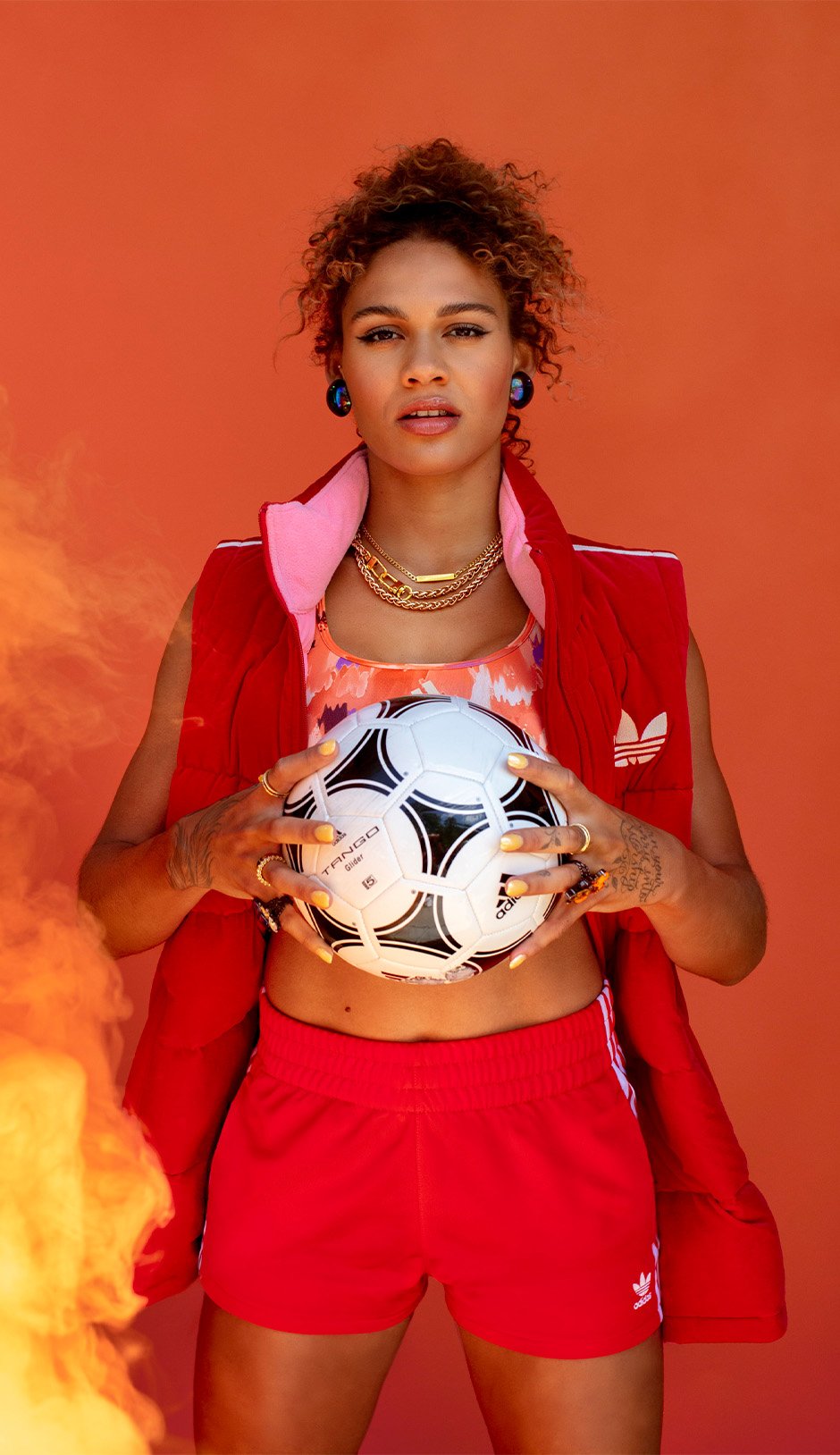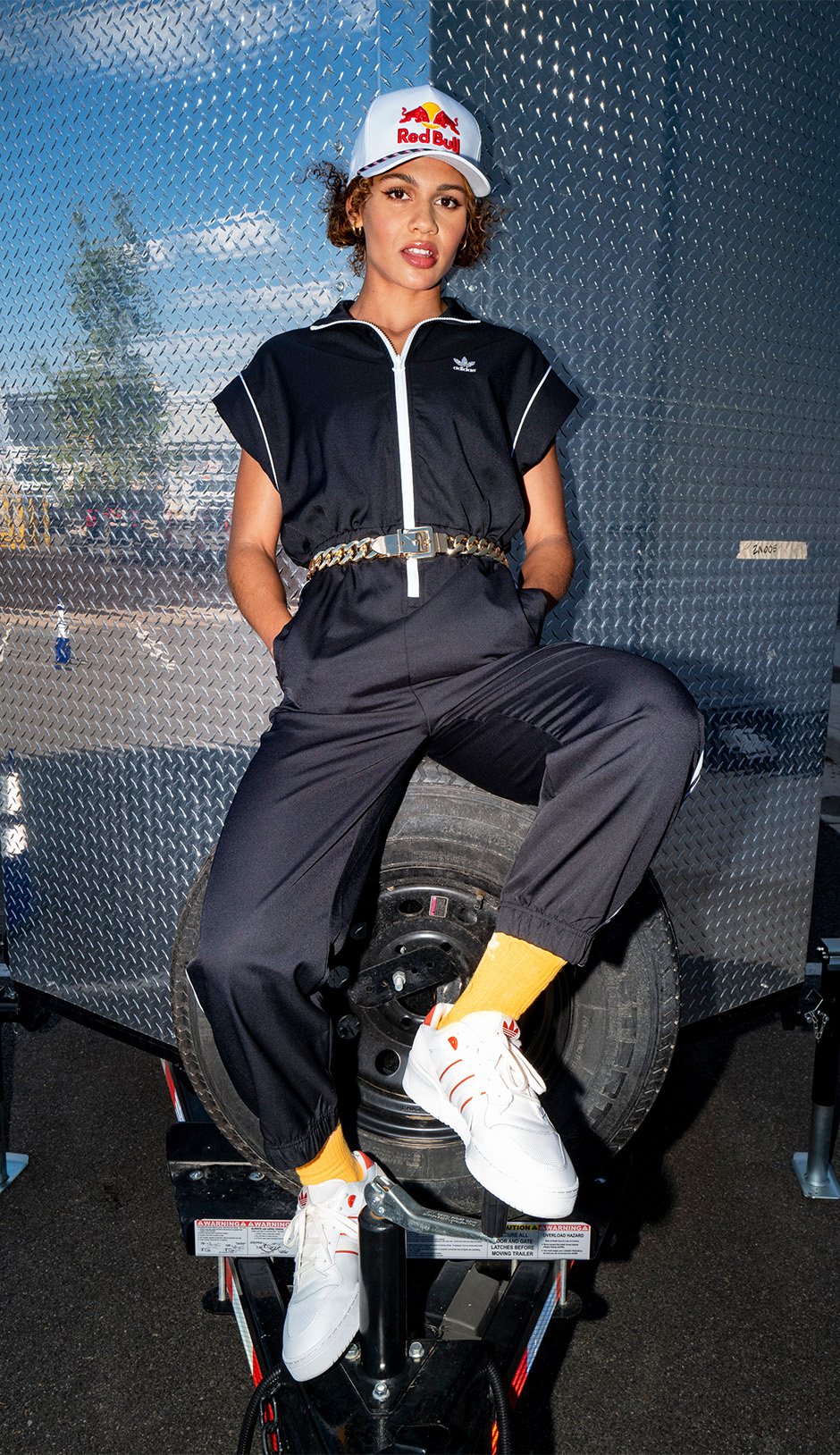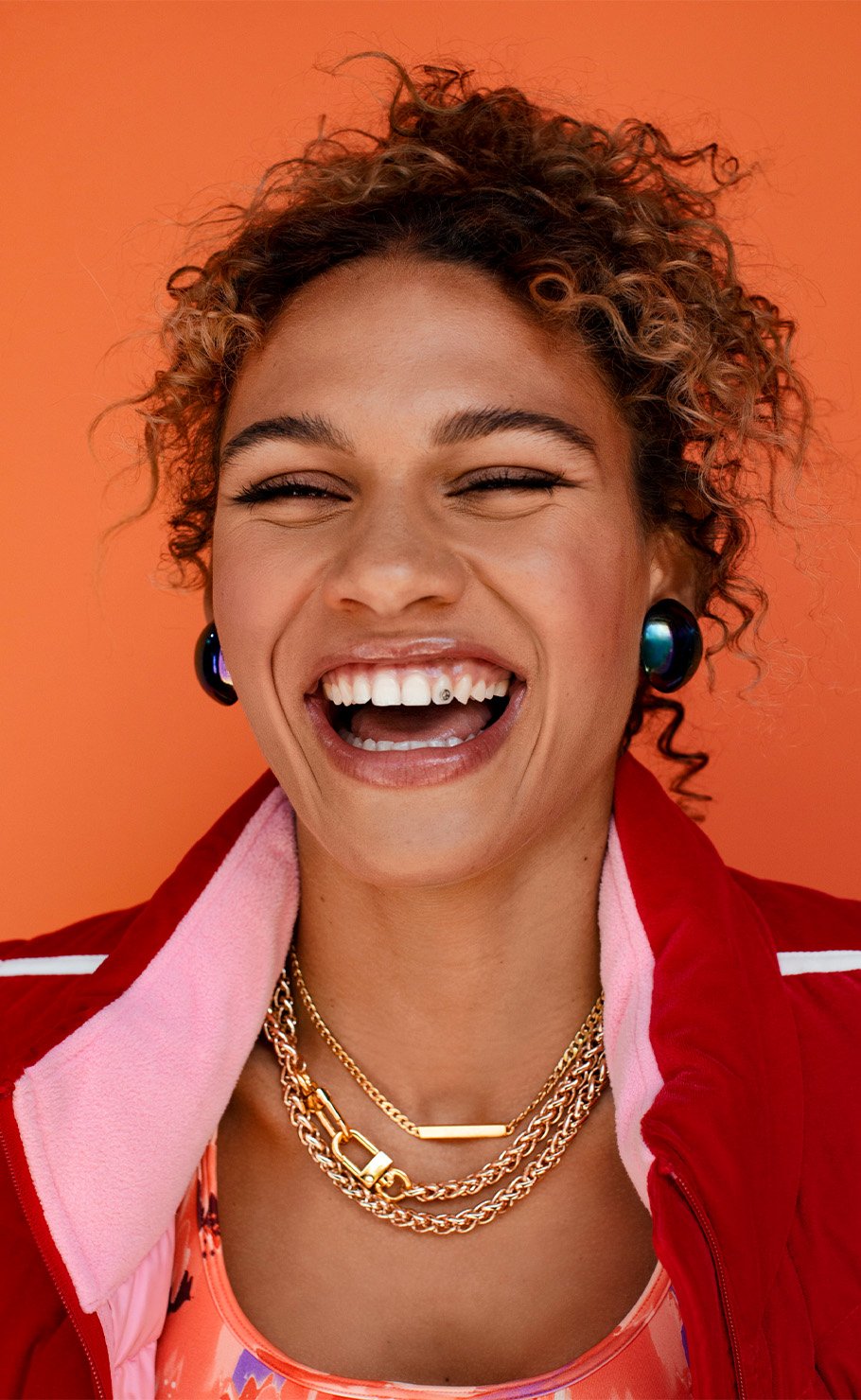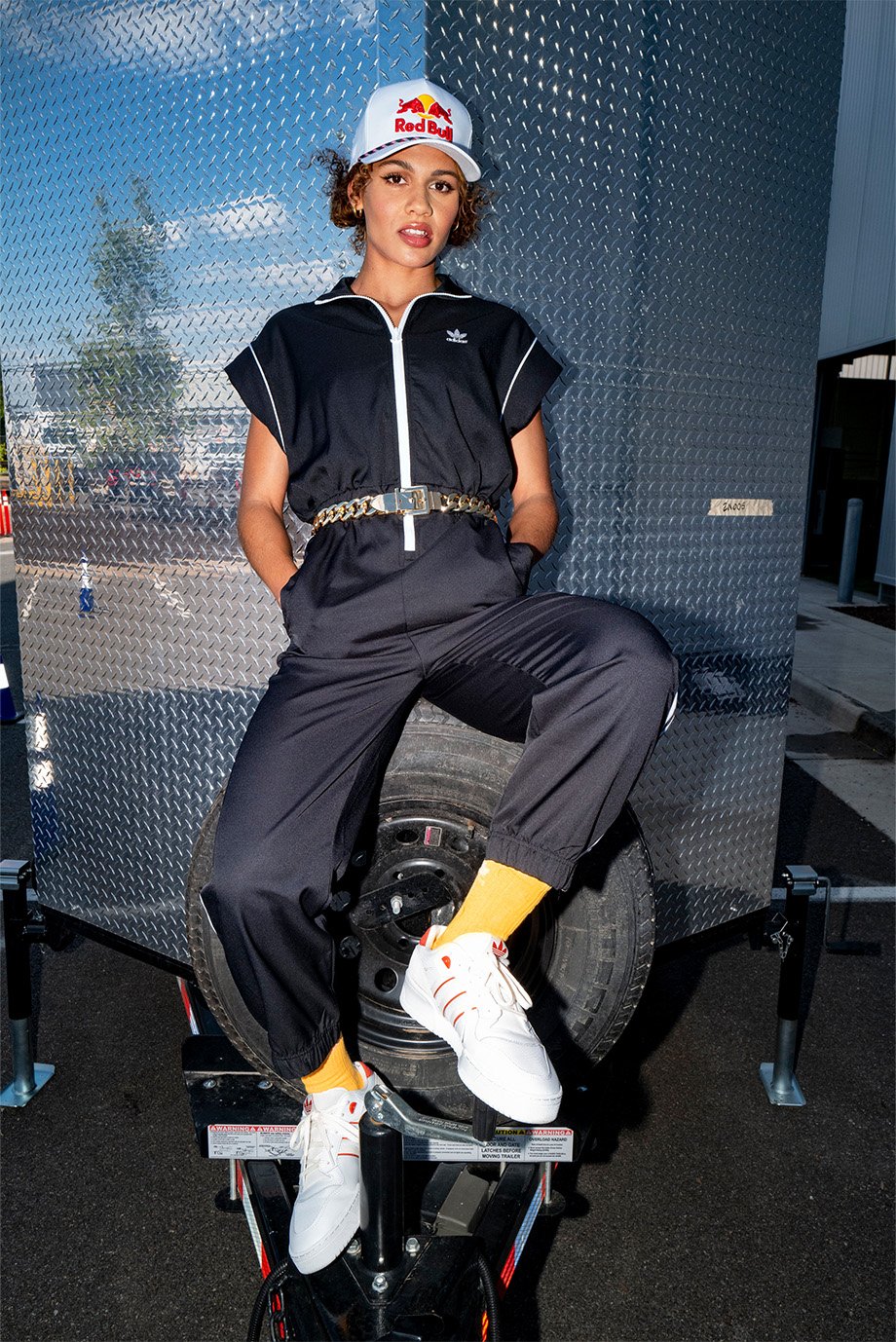With a Kiwi defender tight to her left shoulder, enticing Rodman to drive toward the corner, the American instead abruptly cuts left and back, creating a momentary space. Rodman takes one touch with her right foot and lofts the ball into the box with her left as teammate Mallory Swanson sprints toward the goal. In about a second it goes from Rodman’s left foot to Swanson’s forehead to the back of the net.
About 20 minutes later, Rodman initiates another lovely combination. Her teammate Lynn Williams has good position on the edge of the box and Rodman curves a cross around a defender to Williams, who heads it into the back left corner of the net. The U.S. squad, winners of the last two World Cups and overflowing with talent, closes out the game with a 4-0 win.
There are plenty of logical questions one can ask about Trinity Rodman—after all, she’s so young, and the arc of her professional career is just beginning—but there is simply no question about her star power. The ability to make something out of nothing. To lift fans out of their seats. To showcase the free-spirited beauty and emotion of the game.
Ponder what Rodman has accomplished in Act I of her career. She reached the professional National Women’s Soccer League (NWSL) without playing a single game in college—and wrapped up her debut season with the Washington Spirit as the league’s rookie of the year. She made the assist on an NWSL championship-clinching goal. Last year she signed a seven-figure contract extension with the Spirit that reportedly makes her the highest-paid player in NWSL history. And now, in her third season, she’s trying to lead the Spirit back to the promised land and get her World Cup storyline off the ground.
These days, Rodman is the object of outsized expectations when she steps on the pitch. She’s been in the spotlight for a relatively long time, at first for being a precocious talent with a famous last name and then for being a prolific talent busy making her own name. When you watch Rodman in action, all of her strengths—her world-class speed and skills, of course, but also the tenacity, creativity and joy that she brings to her game—are on full display.
“I think my personality comes through in the way that I play,” says Rodman, who is finding peace and having outsized fun and making art as she tears around the field.
I feel so much freedom when I’m playing.


It’s a wet and miserable April evening at Audi Field in Washington, D.C., the kind of night that inspires some people to wear a trash bag like a coat. But the Washington Spirit and the Houston Dash soldier on. Rodman is all over the field, trying to make something happen. In the first 25 minutes, she sets up two corner kicks and makes a nifty pass to give one of her teammates a solid shot on goal. She is clearly the fastest player on the field and she is pressing hard, even on defense, like she can’t bear to stand still.
Consider how Trinity Rodman careens around the water-logged confines of Audi Field. She is not such an imposing force by some glorious cosmic accident. She willed it to be. This kind of effort takes something beyond talent.
It takes thousands of hours of work.
It takes a hunger.
Two days after that soggy game, Rodman is hustling around a cavernous indoor training facility in suburban Virginia, juggling as a videographer captures 360-degree footage with an airborne camera and dribbling through cones with disarming fluidity as another content creator huffs by her side. Meanwhile, her mother, Michelle, sits in a quiet corner, showing a reporter old Facebook videos foreshadowing Trinity’s greatness. In one, uploaded in August 2011—meaning the girl with the ponytail was 9—Rodman bounces off, dribbles through and outflanks several defenders. Someone is shouting at her to shoot with her left foot but she instead uses her right to slot it cleanly into the bottom corner.
“She started playing soccer when she was 4,” Michelle recalls. “She had this clarity about it even then. She would come off the field on the verge of tears and ask, ‘Mom, why isn’t everyone else trying to win? We need a goal.’ ”
Michelle believes that this focus to dominate on the field is a response to chaos off the field. People who have followed Rodman’s career know that her father is NBA legend Dennis Rodman. Trinity is not keen to discuss the past, present or future of that relationship— she’s focused on establishing her own legacy and on the people who have been by her side the whole way, namely her mother, her brother, DJ, and older sister, Teyana.

To put it bluntly, she always wants to win. She really hates to lose.


Michelle says that Trinity experienced plenty of obstacles growing up. Other girls often were cruel to her, and as she developed as an athlete, people assumed she was advantaged by a life of privilege, heading from practice to a mansion or something. But the reality was entirely different. Michelle was raising these kids as a single mom, struggling financially, sliding from one rental to another around Newport Beach, California.
At one point, the family called a motel home, sharing a room and heating frozen burritos in a microwave oven for dinner. Michelle tried to frame the situation around the positives—the way Trinity and DJ could make waffles at the Comfort Inn’s free breakfast every morning, or take a dip in the small pool before school, or bounce on the beds after dinner. “My goal was always to keep them busy,” Michelle says. “I tried to keep their minds focused on goals.”
So is it any surprise that the soccer pitch became a refuge for Trinity? “Growing up, people didn’t really know what my family and I were going through,” she says. “They didn’t know what we had or didn’t have. But when I was on the field, everything was equal— there was no talk about finances or living situations or family stuff. It was just soccer—the ball and the field and me. I was always happy on the field. And I still feel the same way.”
From an early age, DJ and Trinity, separated by only a year, were intensely competitive. They treated every sporting situation and even unremarkable household moments like competitions of consequence. DJ recalls that in elementary school, he and Trinity had an ongoing battle to see who could call shotgun on the drive to school—an honor that went to whomever could touch the car first. The increasingly fierce footrace escalated until DJ tripped on a pipe by the side of the house and wound up getting seven stitches on his head. DJ laughs out loud when he recounts this story—it has, after all, become a bittersweet symbol of their shared grit.
“I’m a lifelong basketball player and she’s definitely more competitive than any teammate I’ve ever had,” says DJ, who has NBA aspirations and recently transferred to USC to play his final year of college basketball. “To say it bluntly, she always wants to win. She really doesn’t like to lose.”
DJ says he knew his sister was something special when she was in second grade and he goaded her to play in a basketball league—a sport she didn’t like or have experience playing. But she wound up playing against fifth graders and more than holding her own. “That’s when you know someone is a truly great athlete,” he says. “When they’re that good at every sport.”
Still, soccer was always her first love. And when Trinity was 10, her trajectory in the sport changed when her mom brought her to a tryout for the Southern California Blues, a youth club that is a force in the greater Los Angeles region, the unparalleled hotbed of soccer talent in the U.S. Rodman’s raw athleticism and obvious drive impressed the coaches and she made the squad, playing with that club until she was drafted.
The simplest way to summarize Rodman’s youth progression as a soccer player is that she kicked ass. She helped propel her club team to a national championship and two different high school squads to glory. She was first invited to play with the national team when she was 13, going on to play with U-16, U-17 and U-20 squads. In the 2020 CONCACAF U-20 championships, which includes teams from North America, Central America and the Caribbean, Rodman scored nine goals in seven games to help lead the U.S. squad to an undefeated run through the tournament.
After her high school career was over, Rodman enrolled to play and study at Washington State. But before she could play her first collegiate game, the season was canceled due to the pandemic. NWSL rules prohibit high schoolers from entering the draft but now Rodman had cleared that hurdle. On January 13, 2021, the Washington Spirit selected Rodman as the No. 2 pick, making her the youngest player ever drafted in the league’s history. She was 18.
It was the first of many firsts for Rodman. A few months later, minutes after entering her debut professional game, Rodman neatly trapped a long pass and punched it into goal, making her the youngest player to score in the league. She became a starter in the following game. She wound up leading the league in assists that year. "Honestly, my rookie year was my easiest so far,” she admits.
Nobody knew what I could bring to the table. There basically was no pressure on me.





Though Washington controlled the first half, the score is tied until the 55th minute. Spirit midfielder Ashley Sanchez gets the ball in open space and launches a sharp pass behind the defense. Rodman and a defender race at full speed for the ball. In desperation, the defender lunges to deflect the pass, but she can’t quite reach the ball. Yet Rodman, running full bore at a different angle, tracks it down and pokes a shot inches under the left hand of the goalie. The stadium erupts and Rodman flaps her hands over her head in jubilation.
Fifteen minutes later, Rodman ignites another round of celebration. She receives the ball outside the box and accelerates from a jog to a sprint in a diagonal line toward the goal. As she nears the box, the defense collapses on her. At least four defenders are covering or watching her. Just at the moment where it looks like she might try a spectacular low-percentage shot, she crosses the ball with her left foot to Sanchez, who is streaking into open space. Sanchez slams it into the top of the net. Sanchez and Rodman exchange an absurdly formal handshake, like they’re sealing a business deal.
The Spirit wind up winning 3-1 and Rodman, who is two weeks shy of her 21st birthday, ends the afternoon as the youngest player in NWSL history to notch 10 career goals and 10 career assists.
But this is hardly the only way Rodman is impacting the women’s game. You can see it when you walk around Audi Field during a Spirit match. There, hordes of adolescent girls, many wearing official jerseys with Rodman’s name and number on the back, jump to their feet and holler every time their favorite player charges down the sideline. These girls, who later crowd the edge of the field for an autograph or a selfie, love the dynamic way Rodman plays, and also the youthful, human side she shows when she posts dances on TikTok or asks her followers for color suggestions as she does her nails live on Instagram. “I want people to see that I’m a regular person and not just a famous soccer player,” she says.
It’s a Saturday afternoon in early May, and the sun is out in Washington, D.C. The San Diego Wave—led by the striker Alex Morgan, co-captain of the national team—are visiting Audi Field. With both teams sitting near the top of the NWSL standings and more than 12,000 fans in attendance, it’s a big game.

The best way to deal with pressure is to just ignore it.
Perhaps no one can better appreciate the combination of talents that Rodman brings to the pitch than her team’s head coach, Mark Parsons. “I think she has the quality to be something that this planet hasn’t seen in women’s soccer,” he says, itemizing the strengths that his young star brings to the table. Her world- class athleticism. Her competitive mentality. Her technical skills. Her decision-making instincts. Her work ethic. “It’s rare that you find a player with all these qualities, and she’s only 21.”
Parsons describes the intense challenge defenders face trying to cover Rodman. “She can of course run behind you,” he says. “But she also can dribble at your left or your right. She can shoot with both feet. She can pass across and combine with her teammates. You have to be greedy as a striker, but she understands that she wants to feed easy opportunities, too.”
All the players at the professional level have a pretty high level of commitment, but Parsons says Rodman has something extra, a drive that comes from within. “When we don’t have the ball, Trinity chases, hunts and presses like her life depends on it,” he says. And it’s not something that only plays out in the physical realm. Parsons, recalling the flight back to Washington after a recent game in Orlando, says that Rodman spent her time in the air watching a replay of the game they’d just finished. Twice.



But when I was on the field, everything was equal… And I still feel the same way.














One of the beautiful things about the game of soccer is the freedom that it affords.



Talking to any 21-year-old, even a high-profile professional athlete, about the future is always strange. They are too busy wrestling with the present and absorbing the recent past to have much bandwidth or interest to peer into the future. This is a beautiful thing, because the present is the place to be. You don’t enjoy a party or live out your dreams in the distant future; you do it right now.
But even as she makes strides to become more consistently relentless during games and practices, Rodman is committed to having a good time. Being serious about performance, she insists, does not require a moratorium on fun. This perspective comes through loud and clear in Rodman’s social media presence. On Instagram and especially TikTok, Rodman is accessible and fun loving.
“You’re never going to shut me up,” she laughs. “I’m always dancing. I’m always singing around the [practice] facility and the locker room. I’m always telling jokes and messing with people.”
This approach even impacts her preparation for big games, where she’s more likely to record a dance clip for TikTok than meditate in silence. “I know a lot of athletes like to spend those moments with headphones on, locked in,” Rodman says. “I’m the opposite of that. I need to be carefree and listening to music—I play my best when I’m not overthinking or feeling isolated from the world. I want to feel connected with everybody.”
Parsons has zero issues with his star’s easygoing demeanor. “I know some coaches who would think she doesn’t care because she’s laughing so much,” he says. “I care about the player being ready to perform. Trin is very loose, full of joy, and you can see in critical moments how she’s full of passion. You can see her bring joy to the biggest moments.”
On June 21, Rodman got public confirmation that she had been selected to join the U.S. national team for the fast-approaching World Cup. Most soccer pundits think that Rodman has the qualities to be a long-term fixture on the national team, perennially the strongest women’s squad on the planet. Right now Rodman faces intense expectations—will she start? Score? Show her greatness on a global stage?
If these are questions that Rodman is mulling over, she keeps that to herself. Her mother—whom Trinity calls her “bestie”—says they chat about basically everything, but they don’t talk much about the World Cup. But Trinity is hardly reserved when asked about the differences between practicing with her Spirit teammates and the hall-of-fame caliber players on the national team. Without a doubt, she says, there’s something profoundly comfortable about playing with the Spirit—the depth of the relationships and the way she’s been able to intuit what everyone is usually thinking on the field.
Playing with the national team is a completely different story. “The standard is just so high,” she says, noting that many of the top women have played together for 10-plus years. “It’s a very new environment for me, and I have to focus on gauging that environment, building relationships and learning people’s tendencies on the field.”
One thing she has quickly absorbed is the intensity with which these American soccer legends treat every moment. “There’s no doubt that playing on the same side as Alex Morgan, Megan Rapinoe and Becky Sauermann is surreal,” Rodman says. “You can tell who’s been on the national team for a while because they play with this grit and relentlessness.” There is no such thing as an easy scrimmage or a casual drill.
“That’s kind of the whole point,” Rodman continues. “It’s the national team and we’re not there to make friends. We’re trying to make each other better every step of the way and we’ll work just as hard—or maybe even harder—against each other than against our real competitors.”
Parsons, her coach, is delighted to hear of this reflection and adds that he sees Rodman growing in this regard. “Last year, she was more inconsistent in her impact,” he says. “She would be there, the best player on the team, and then she would disappear and then she would come back. This year she’s been more consistent. This is totally normal for a young player.”
Not surprisingly, Rodman doesn’t have a simplistic answer when asked how she manages pressure. She holds herself to a very high standard, which influences her approach to preparation— whether it’s in the weight room or during drills or studying film. But beyond that, she tries to filter out external pressures.
“The best way to deal with pressure is to just ignore it,” she says. “Everyone has opinions, but I have a sense that I got here for a reason, and outside pressures do nothing but put your own expectations too high and start impacting every little detail of your game.”
This sounds tricky, holding herself to a very high standard while tuning out things that would raise her own expectations. So I ask her to explain the difference.
"I think the best way to become the best player is to fail all the time,” she says.
Every player has the ability to be as creative as they want to be, to do dangerous things, to put on a show.


Rodman is, not surprisingly, an artist. This isn’t a metaphor; she likes to paint when she finds the time. With all the demands of her pro squad and the national team, it’s been tough lately to find the time. Rodman says she has taken “every art class I could ever take” and travels with a sketch pad—drawing animals and abstract figures and portraits of people she sees. “I love to sketch with a pencil,” she says. “I like to draw whatever comes to mind. I’m not trying to make it perfect. I do it because I love it.”
Once, right before Rodman left to go to college, she visited her sister, who wanted to hire a professional to paint a zoo scene on her son’s bedroom walls. Trinity says she had two hours to kill before she had to head to the airport, so she sketched and then painted a giant giraffe on her nephew’s wall. It’s a cool story, no doubt, but the context is clearer later when Trinity’s mom whips out her phone and pulls up a photo of the giraffe. It’s not some sweet gesture; it looks pro.
“It’s like soccer,” Trinity says, offering a writer a shrink-wrapped transition.
It’s an outlet, a way to express myself beyond words.



Sure, there are lines on the field and a book full of rules and coaches prowling the sidelines, but the reality remains that skilled players have boundless opportunities to improvise and express themselves artfully.
Indeed, there’s an artfulness to the way Rodman plays the game. Perhaps because her feet and her mind often move a little faster than most everyone else, she is able to summon these bursts of creativity that turn ordinary moments into something magical. There is a YouTube video, unironically titled Trinity Rodman Soccer Highlights That Will Blow Your Mind!, that showcases the flair she integrates into her play. She runs down balls that should not be reachable. She pokes the ball through the legs of hapless defenders—megging them, in soccer parlance. And perhaps most of all, she makes gorgeous crossing passes to teammates, as if she has intuited all the angles before she even receives the ball.
“I definitely don’t practice that kind of stuff that I do in games,” Rodman says when asked where this on-field creativity comes from. “It just kind of happens. But as soon as a game begins, my feet just start moving.”


And allowing myself to make mistakes has helped my game and my mental well-being.


In real terms, Rodman says, this means she has learned to trust her instincts, to make quick decisions—about what to do with the ball before she receives it, for instance—and then give herself a break if it doesn’t succeed. She watches hours of film of each game and says she hates seeing herself trying to do something amazing on her own when a teammate was open. But she resists being self- critical if she tried a pass or a run with a good idea in mind and it didn’t work out. It’s just something to clinically work on and try to do better the next time.
Allowing herself that kind of freedom is a big part of what Rodman loves about soccer. “Outside of team principles, every single player on the field has the ability to do essentially whatever they want,” she says, articulating something about the fluidity of the game and the way that she plays it. “Every player has the ability to be as creative as they want to be, to do dangerous things, to put on a show. There’s something so entertaining about that. I don’t think soccer is just a sport.”
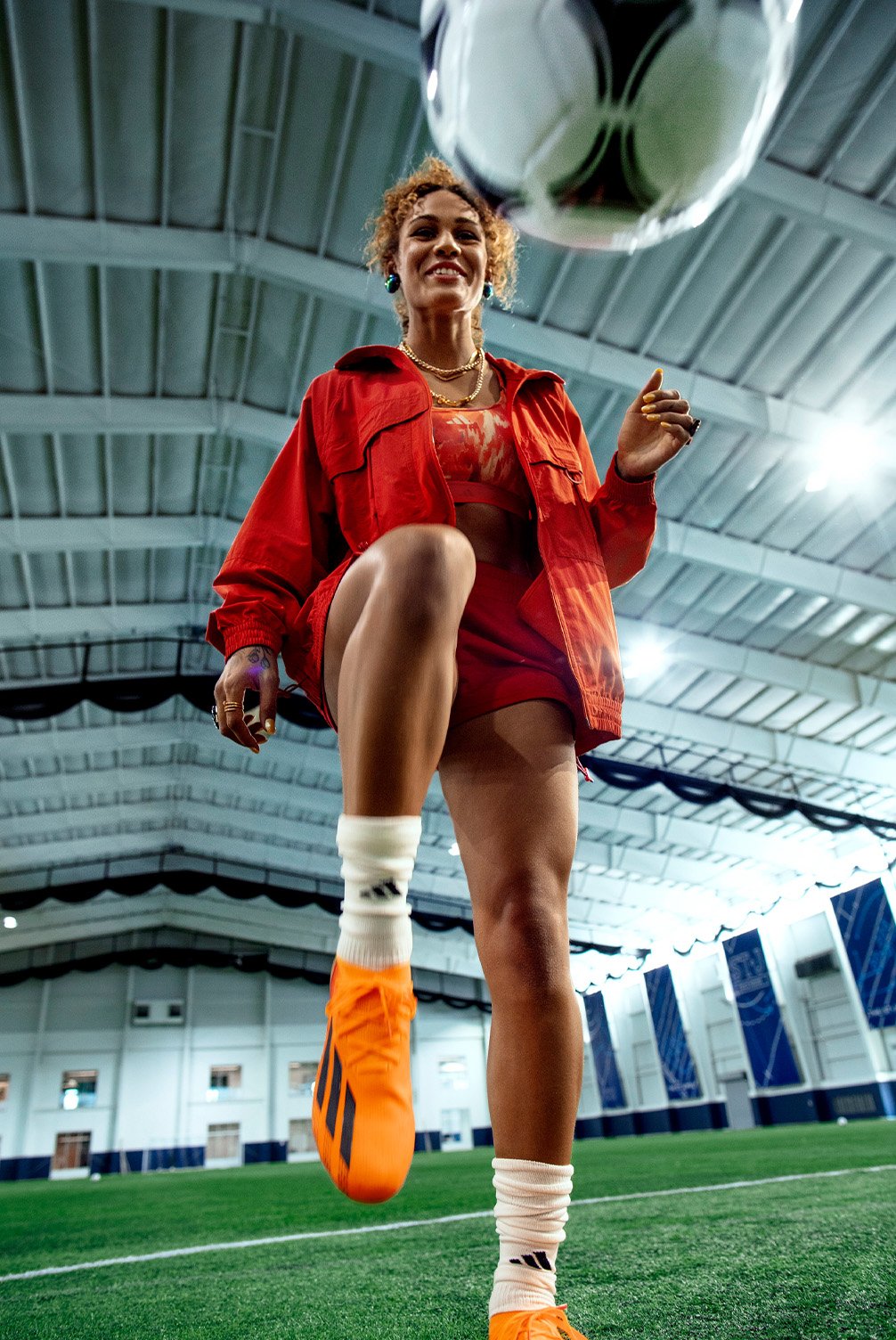

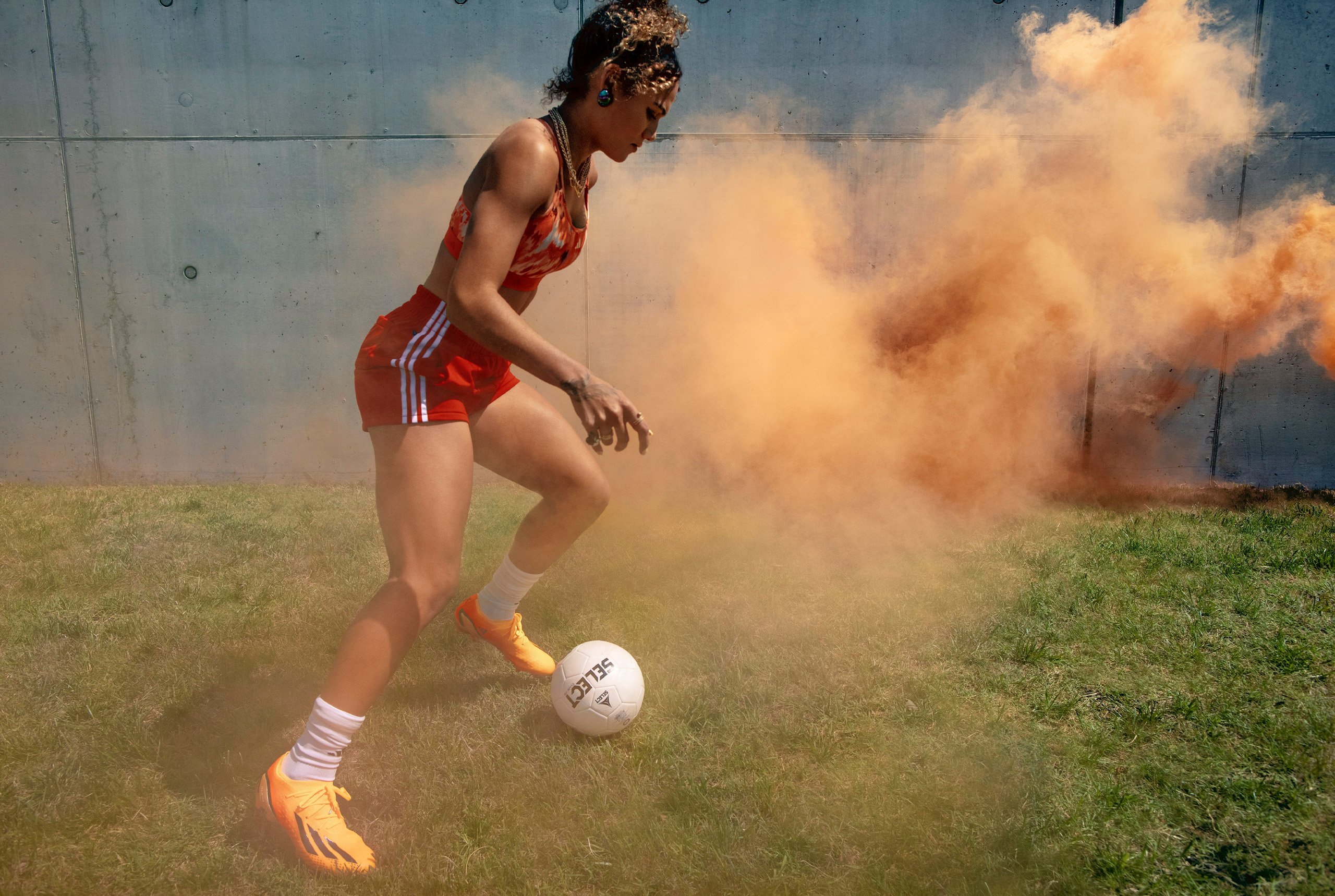
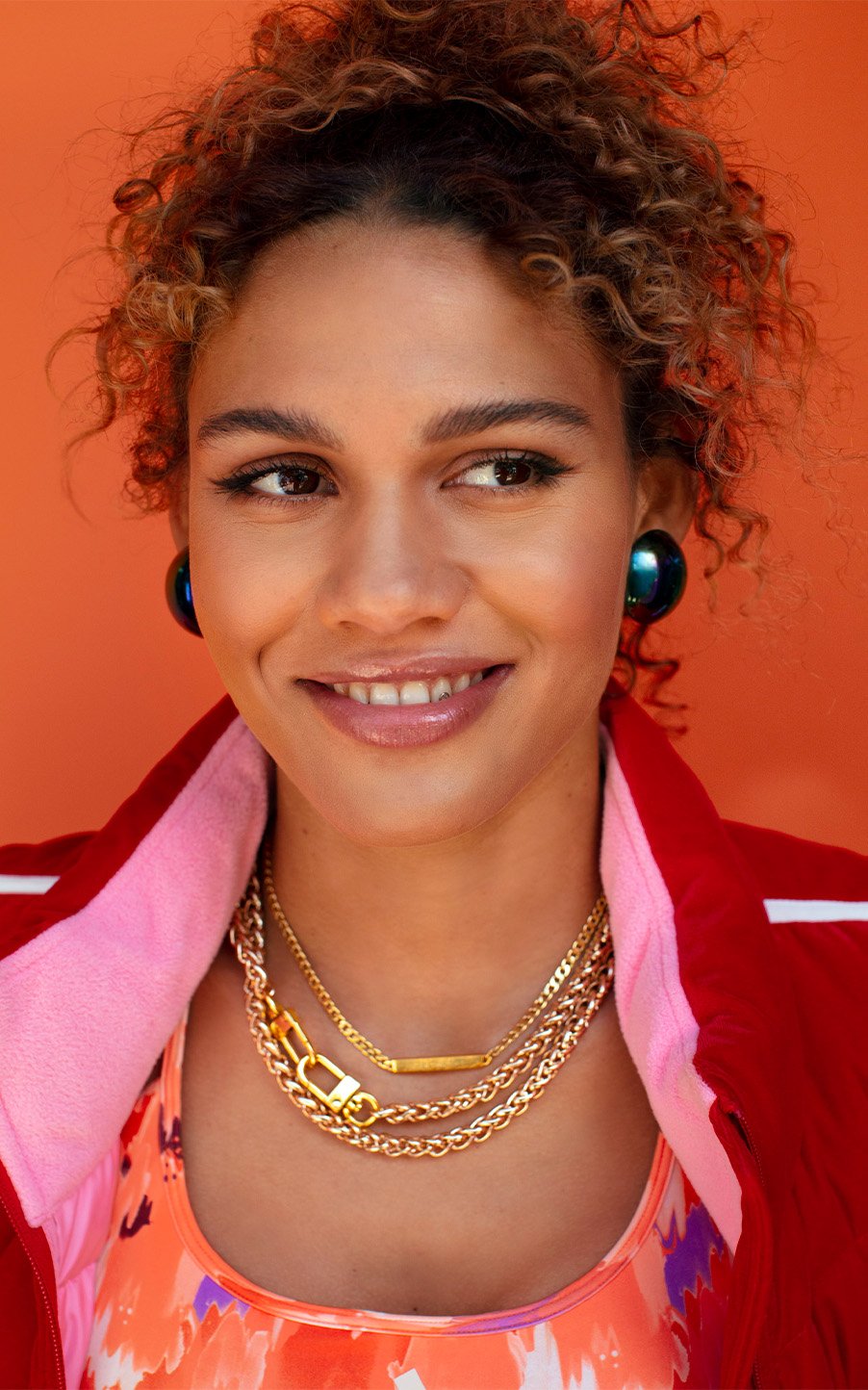








Trinity Rodman runs onto the field. Six minutes later, the young striker—she’s four months shy of turning 21 at the time—receives a perfect pass as she streaks toward the right corner.
It’s halftime in New Zealand. The U.S. women’s national team is officially beginning its 2023 World Cup campaign with a January contest against the co-hosts of that looming, all-important tournament. Although the Americans dominated possession in the opening 45 minutes, the score remains 0-0. The U.S. coach, hoping to inject energy into the game and break the deadlock, begins the second half with four substitutions.










The future of women’s soccer has arrived.
Her name is Trinity Rodman.



Hover to explore
2006

As a 10 year-old, Rodman joins the Southern California Blues youth soccer club.

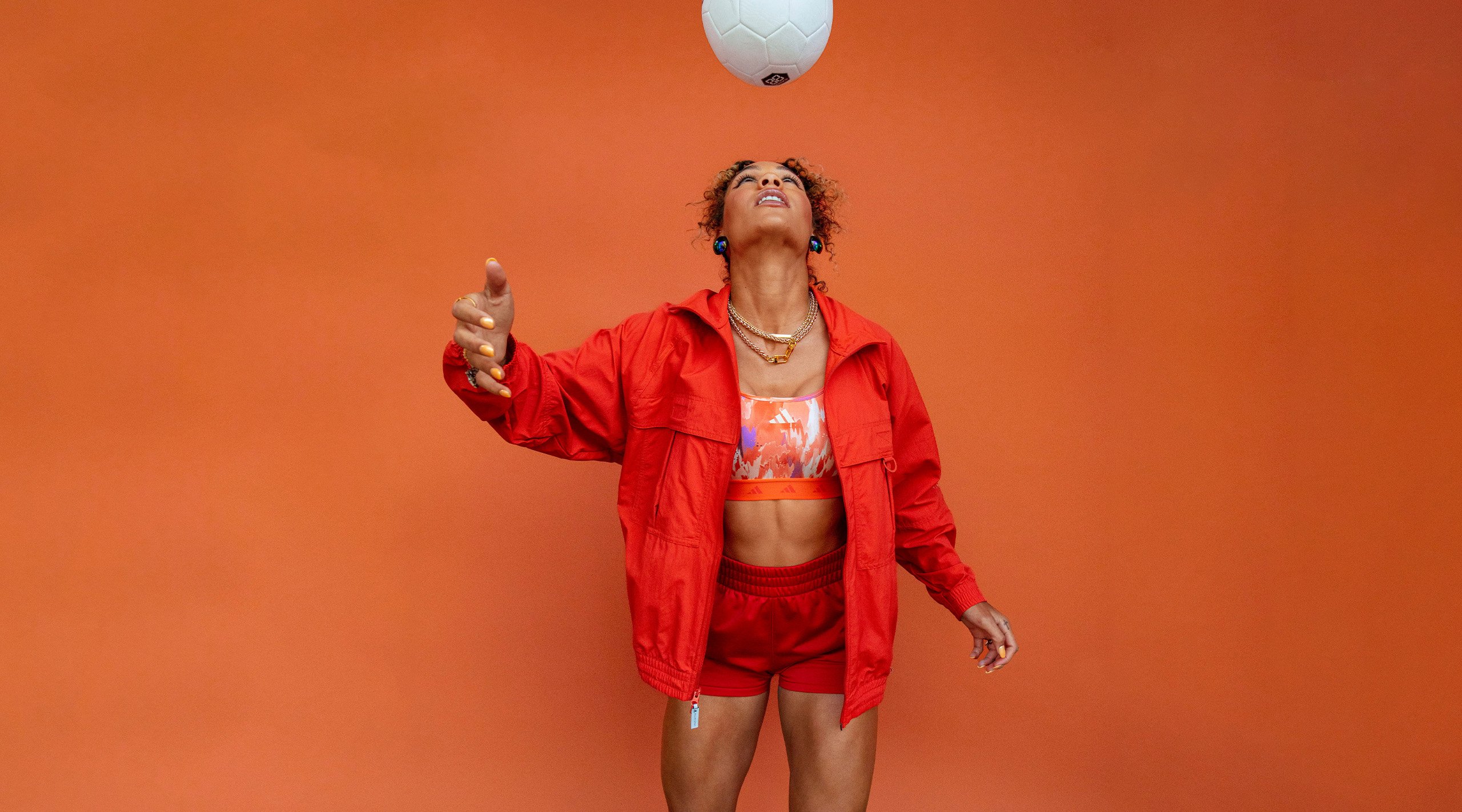




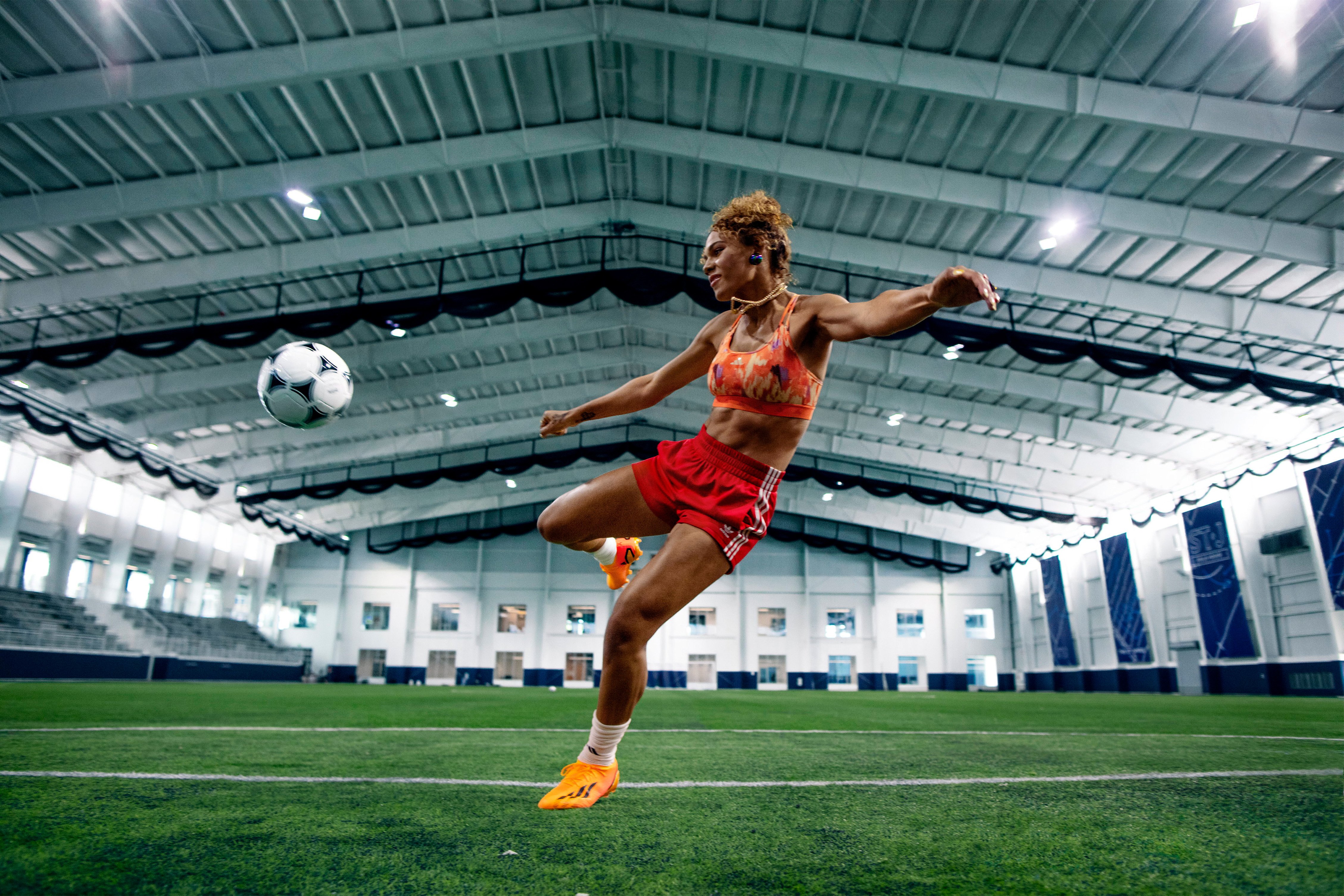


Rodman begins playing soccer at 4 years old.

Selected to
join the Washington
Spirit, making Rodman the youngest player ever drafted into the National Women’s Soccer League at
age 18.

Rodman joins
players Megan Rapinoe
and Alex Morgan on the U.S. women’s national team.
2023

2021

2012



























































Click to explore

Though Washington controlled the first half, the score is tied until the 55th minute. Spirit midfielder Ashley Sanchez gets the ball in open space and launches a sharp pass behind the defense. Rodman and a defender race at full speed for the ball. In desperation, the defender lunges to deflect the pass, but she can’t quite reach the ball. Yet Rodman, running full bore at a different angle, tracks it down and pokes a shot inches under the left hand of the goalie. The stadium erupts and Rodman flaps her hands over her head in jubilation.
Fifteen minutes later, Rodman ignites another round of celebration. She receives the ball outside the box and accelerates from a jog to a sprint in a diagonal line toward the goal. As she nears the box, the defense collapses on her. At least four defenders are covering or watching her. Just at the moment where it looks like she might try a spectacular low-percentage shot, she crosses the ball with her left foot to Sanchez, who is streaking into open space. Sanchez slams it into the top of the net. Sanchez and Rodman exchange an absurdly formal handshake, like they’re sealing a business deal.
The Spirit wind up winning 3-1 and Rodman, who is two weeks shy of her 21st birthday, ends the afternoon as the youngest player in NWSL history to notch 10 career goals and 10 career assists.
But this is hardly the only way Rodman is impacting the women’s game. You can see it when you walk around Audi Field during a Spirit match. There, hordes of adolescent girls, many wearing official jerseys with Rodman’s name and number on the back, jump to their feet and holler every time their favorite player charges down the sideline. These girls, who later crowd the edge of the field for an autograph or a selfie, love the dynamic way Rodman plays, and also the youthful, human side she shows when she posts dances on TikTok or asks her followers for color suggestions as she does her nails live on Instagram. “I want people to see that I’m a regular person and not just a famous soccer player,” she says.

On June 21, Rodman got public confirmation that she had been selected to join the U.S. national team for the fast-approaching World Cup. Most soccer pundits think that Rodman has the qualities to be a long-term fixture on the national team, perennially the strongest women’s squad on the planet. Right now Rodman faces intense expectations—will she start? Score? Show her greatness on a global stage?
If these are questions that Rodman is mulling over, she keeps that to herself. Her mother—whom Trinity calls her “bestie”—says they chat about basically everything, but they don’t talk much about the World Cup. But Trinity is hardly reserved when asked about the differences between practicing with her Spirit teammates and the hall-of-fame caliber players on the national team. Without a doubt, she says, there’s something profoundly comfortable about playing with the Spirit—the depth of the relationships and the way she’s been able to intuit what everyone is usually thinking on the field.
Playing with the national team is a completely different story. “The standard is just so high,” she says, noting that many of the top women have played together for 10-plus years. “It’s a very new environment for me, and I have to focus on gauging that environment, building relationships and learning people’s tendencies on the field.”
One thing she has quickly absorbed is the intensity with which these American soccer legends treat every moment. “There’s no doubt that playing on the same side as Alex Morgan, Megan Rapinoe and Becky Sauermann is surreal,” Rodman says. “You can tell who’s been on the national team for a while because they play with this grit and relentlessness.” There is no such thing as an easy scrimmage or a casual drill.




























Every player has the ability to be as creative as they want to be, to do dangerous things,
to put on a show.



